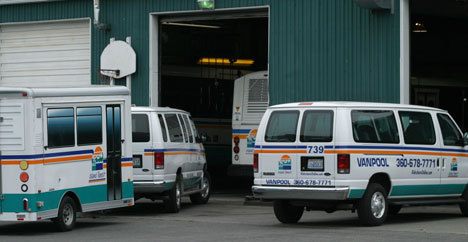There will be swift and far-reaching service cuts affecting South End bus routes if voters don’t approve an increase in the sales tax for Island Transit next month.
Within days of the Aug. 18 primary vote, Saturday service will be cut and 33 percent of current routes will be cut back or eliminated.
No one at Island Transit wants that to happen, but they say they have no choice.
“Over the past couple of years, overall fuel prices have gone crazy,” said Island Transit Director Martha Rose. “We also have been monitoring the drop in sales-tax revenue, which declined 8 percent last year, and another 9 percent year-to-date; 17 percent total over the last 18 months alone.”
The free-to-ride bus system is paid for by a six-tenths of 1 percent tax on retail sales in Island County. Transit officials are asking for an increase of three-tenths of
1 percent to reach the maximum sales tax allowed by state law.
The federal government has compounded the problem by cutting back grants during the past four years that allowed Island Transit to keep a modern fleet of buses operating, Rose said.
“Since 2005, our costs for spare parts has risen 36 percent, so we can keep our 69 buses in good running order,” she said.
“Sales-tax revenue and loss of government funding has been a double whammy for us,” added finance manager Sandra Kuykendall. “And, of course, there’s the cost of fuel.”
Island Transit isn’t the only bus operation facing financial problems. King County Metro expects a $213 million shortage the next two years, rising to $288 million by 2012, and officials are working on plans to cut every one of the system’s 225 routes.
Rose said that she and her staff review budget requirements on a regular basis. When they realized in May that there would be a $2 million shortfall, they went to their board, who agreed to a simple-majority-needed ballot measure raising the levy.
“The bottom line is that it’s up to the voters,” Rose said.
If it doesn’t pass, routes that may be curtailed or cut completely include:
• Route 5 from Freeland to Langley along Saratoga Road will be shut down.
• Route 6 from Oak Harbor to Coupeville via West Beach may be reduced to morning and afternoon service.
• Route 7, the Langley Loop, is facing the ax. It takes riders from the Clinton ferry dock, through Langley and Bayview, ending in Freeland.
• Route 8 from the Clinton ferry dock through Scatchet Head to downtown Langley and ending in Bayview is on the chopping block.
• Route 9 is the weekday Oak Harbor shuttle; it’s future remains uncertain.
Rose said that her staff looks at ridership, demand and the amount of paratransit deviation for each route. Over the years, the amount of paratransit service to rural areas has escalated and is growing by 30 percent annually.
“We’re still evaluating the routes carefully, and will continue to do so,” Rose noted. “We don’t want to cut anything, but that’s where we are.”
There has been opposition to the proposed sales-tax increase.
The Oak Harbor Chamber of Commerce, though recognizing the value to the county of the transit system, has recommended a “no” vote.
Members expressed worries about the lack of a “sunset” clause which would reduce the tax at a specific date, the use of the $500,000 additional tax funds collected in excess of the estimated shortfall and the intended use of those funds.
Some island taxpayers have also complained that Island Transit doesn’t charge those who travel on buses.
That argument doesn’t cut it with Rose.
“First, we know ridership would decline,” Rose said. “Then, all the money collected would end up paying for the cost of administering the fare-box program, generating no useful income.”
Several studies have been conducted over the years to determine the feasibility of having individuals pay for their own transportation. Typically, for smaller or rural transit systems, the impact on traffic can be dramatic. First-year costs to get the system in place and operating are estimated at $7 million.
“I’d rather use that money to maintain or expand our services,” Rose said.
Since Island Transit is a wholly separate municipality and not part of county government, there is no bailout safety net.
The system’s annual $10 million operating budget covers everything but capital costs such as new buses, transit centers and a long-delayed maintenance facility upgrade in Coupeville.
Rose said that the value of the goods and services, plus payroll take-home of Island Transit employees, amounted to more than $4.4 million through May 31. That money was returned directly to the island’s economy.
“For every buck spent by taxpayers for public transportation, the economic return is 4-to-1 by creating jobs, congestion relief and health savings,” Rose said.
Operations manager Shawn Harris said he has another concern.
“One of my main worries is laying off employees,” he said. “When we cut back routes, there’s a potential for losing up to 39 bus drivers, maintenance and support staff,” Harris said.
“No one wants that.”
For details, visit www.islandtransit.org.



